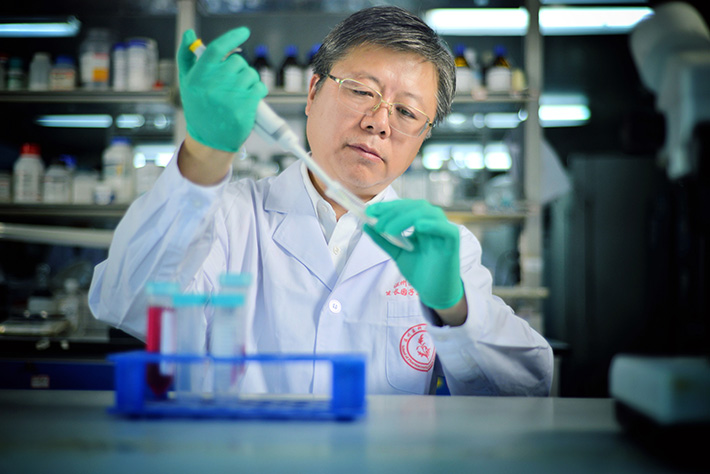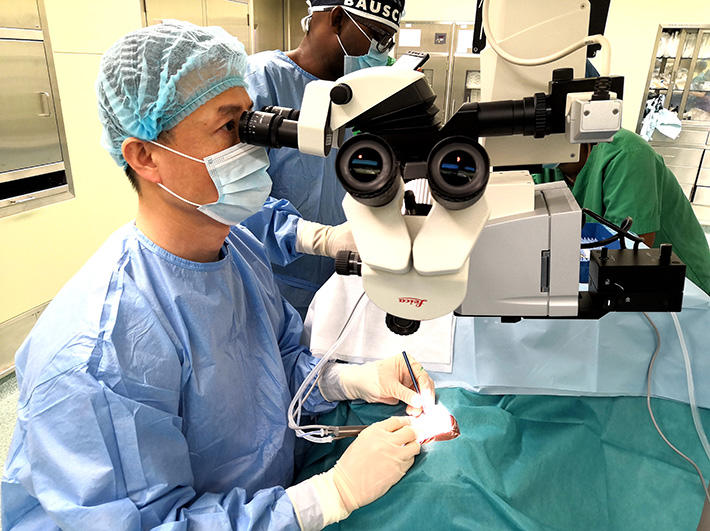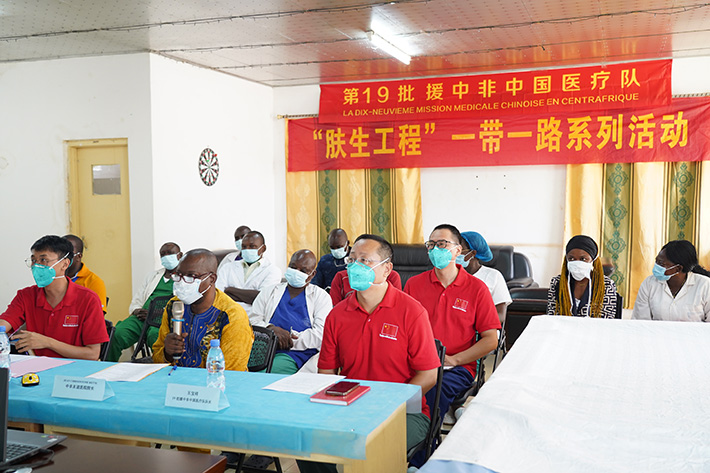|
||||||||||
| Home Nation World Business Opinion Lifestyle ChinAfrica Multimedia Columnists Documents Special Reports |
|
||||||||||
| Home Nation World Business Opinion Lifestyle ChinAfrica Multimedia Columnists Documents Special Reports |
| ChinAfrica |
| A Benevolent Mission |
| A Chinese scientist and his university are committed to improving the health situation on the African continent |
| By Ge Lijun 丨VOL. 15 April 2023 ·2023-03-27 |

Li Xiaokun, member of the Chinese Academy of Engineering and president of Wenzhou Medical University
For around 30 years, Li Xiaokun has been in charge of his research team in China studying growth factors. Li, who was born in 1964, spent his early years in Fuping County of Shaanxi Province, where he frequently saw his relatives’ lives being ruined by illness. These events caused him pain, but they also triggered his passion for medicine.
He saw more than a dozen people pass away in a week while working as a trainee in the oncology department of a hospital, but he was unable to do anything. He understood that effective therapies need a foundation in science.
In 1992, Li enrolled at Sun Yat-sen University of Medical Sciences as a doctoral student in microbiology and biochemical pharmacology while also working part-time as a research assistant at Jinan University’s Institute of Biological Engineering, where he was assigned to conduct growth factor research.
One day when he was cycling home, he fell and sustained significant injuries. He was transported home after receiving treatment at a hospital. He was unable to sleep that night because of acute pain. He took a quick look at the growth factor vials on his desk, which were reagents for animal experimentation.
“What if I use it on myself?” he thought. But the scientific community at the time believed that this type of growth factor carried a danger of tumour development and uncontrolled cell proliferation. He ultimately used it on his own face despite the anxiety. And the result was amazingly good.
Following that, Li and his institute began a clinical study on it, and the outcomes were superb. Unfortunately, the growth factor medication was not well received by the biology community, either in China or overseas. Li kept going. His first worldwide fibroblast growth factor medication was created in 1998 and formally launched after receiving the required permissions, the result of six years of arduous work.
Li is now the president of Wenzhou Medical University (WMU) in east China’s Zhejiang Province and a member of the Chinese Academy of Engineering. He began the Fusheng (skin restoration) Charity (F&S Charity) in early 2020 to offer assistance to people with trauma-related issues. More than 30,000 individuals have benefitted from the 56 aid locations the team has established in Wenzhou and places in central and west China.

A medical professional from the Eye Hospital of WMU works in Burkina Faso in January 2019
Venturing Into Africa
The Chinese-Central African F&S Charity project was launched on 12 November 2021. Through the donation of scarce medicines and equipment, telemedicine, and staff training, the project assists the Central African Republic (CAR) in establishing a system for the treatment and prevention of difficult-to-heal wounds and meet the needs of local patients for the treatment of traumatic injuries.
The injury on the left leg Benjamin Anikbala of CAR sustained in a vehicle accident some years ago turned into an inflamed ulcer as a result of improper care. Due to his injuries, he was unable to work and lost his income, which forced his children to drop out of school. He desperately sought assistance from Chinese medical staff. He was treated through the F&S Charity initiative using telemedicine and other techniques. Following two months of attentive treatment, the ulcer had shrunk by 25 percent. “The assistance of the Chinese physicians gave me hope,” he said with joy.
To create organised treatment plans in situations like this, the F&S Charity team arranges monthly virtual meetings with members of Chinese medical teams working in Africa.
In order to establish a specialty in infection and trauma, the First Affiliated Hospital of WMU and Friendship Hospital of Bangui (FHB) in CAR signed a cooperation agreement on 27 July 2022. Now, the F&S Charity project team at WMU is supervising the training of doctors from FHB. The charity also participated in public service projects in China and stated their desire to actively support foreign medical aid, Li told ChinAfrica.
“In the second half of this year, we hope to deploy a team of skin restoration specialists to CAR to carry out the S&F Charity project operations there,” he continued.

The Fusheng Charity project team communicates via video link with the Chinese medical team in the Central African Republic in August 2022
Increased collaboration
Up to date, WMU and its affiliated hospitals have dispatched 85 medical professionals to seven African countries, including CAR, Mali and Namibia. In 2018 and 2019, a team from the Eye Hospital of WMU travelled to Burkina Faso to provide free treatment for more than 600 cataract patients. With the resumption of diplomatic ties between the two countries in May 2018, this is the first short-term health aid initiative to be undertaken in Burkina Faso.
Since the start of the COVID-19 pandemic in late 2019, WMU has amassed a wealth of knowledge about prevention and treatment of the disease in China, shared it with medical professionals in Africa, and given tangible medical support to 34 alumni who were battling the pandemic in nine African nations.
So far, WMU has provided trainings to 650 African students as part of the Belt and Road Initiative. In order to better the conditions for expectant mothers and newborns in Africa, the university introduced the first African midwifery assistant training programme in China in 2018. More than 200 African students and nurses have been trained in the past three years.
The project also plans to further expand. To increase the scope of the initiative and keep improving the training programmes, Li stated that beginning from this year, one to two midwifery training sessions will be held annually. Also, WMU and Egyptian Chinese University in Cairo created the TCM Cooperation and Research Centre last year to collaborate in the area of traditional Chinese medicine.
|
||||||||||||
| About Us | Contact Us | Advertise with Us | Subscribe |
| Copyright Beijing Review All rights reserved 京ICP备08005356号-5 京公网安备110102005860号 |